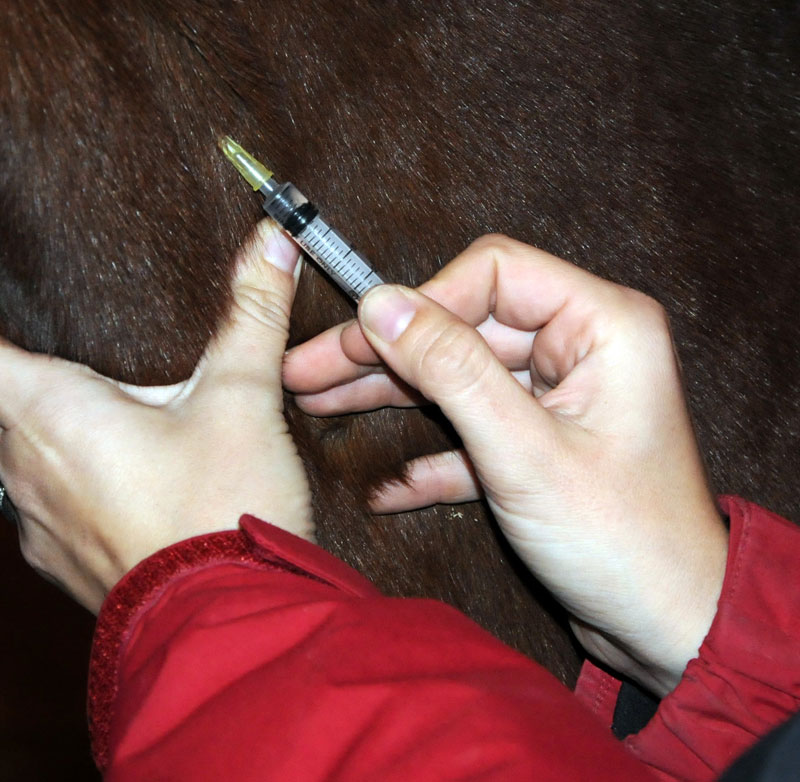More than six months after a major scandal prompted formation of a task force looking into the U.S. Equestrian Federation’s drugs and medications program and testing laboratory, no decision has been announced on whether the organization will scrap the lab.
The bet here is that the USEF will continue to be the world’s sole sports federation that runs its own lab, but likely with some adjustments. Many federations not only outsource lab work, but the hearing process as well, something which USEF also conducts in-house. Over the last 10 years, the lab handled 132,000 samples for USEF, in addition to testing for 19 different horse organizations. Testing is something that many who participate in USEF shows have experienced, making it a matter of broad-based concern for members.
Questions flew fast and furious in January, when a mistake made in the USEF lab led to reversal of well-publicized hefty suspensions and fines levied against hunter trainer Larry Glefke and rider Kelley Farmer. It was particularly humiliating because a year earlier, at the USEF’s 2017 annual meeting, the organization highlighted the severe punishment it levied against the two in connection with a horse testing positive for Gaba, a prohibited substance.
The error involved mishandling of the “B” or second, confirmatory sample taken from the horse in question. At the 2018 annual meeting, USEF President Murray Kessler announced that as a result of the error, no further B samples would be tested by the USEF lab, at least until the situation was sorted out. But he also raised among the options going forward a possibility that the USEF might stop running its lab, even though veterinary committee chairman Kent Allen cautioned against “throwing the baby out with the bath water.”
In the wake of the embarrassment, the lab director departed, the lab became a direct report to CEO Bill Moroney, an “integrity” program was started that enables members to report issues in the field regarding testing and the task force headed by Tom O’Mara was established to begin examining all aspects of the program. The problem was made worse in the Glefke/Farmer case because the mistake involving the B sample was not disclosed to USEF management, the legal team or the hearing committee that was dealing with the matter. As a result, USEF is re-emphasizing the employee whistleblower program, under which employees must report to management when they think federation procedures or policies are being violated.
The lab was created in 1995, 25 years after what was then the American Horse Shows Association pioneered drug testing – to the consternation of the trainers who relied on chemicals as part of the regimen for their show horses. There was a need to create a lab that could handle things for equestrian sport, which is different than the substances looked for in testing race horses. Today however, there are labs used by foreign federations that can run appropriate tests for equestrian sport, Tom pointed out.
The lab question is an especially sticky wicket because drug testing is a cornerstone of the USEF mission to protect and support equine welfare, which also mandates sportsmanship and fair play. The primary asset of the lab is equipment, since it leases the space where it is located. But the task force report during the USEF’s mid-year meeting this summer revealed it would cost $4.8 million to update the equipment with $1 million in savings as a result, netting out at $3.8 million.
“We’re way behind on investment,” Murray said at the meeting.
While it comprises 21 per cent of the USEF’s $32 million in revenue, with various costs including building lease and salaries, the D&M program” is not a moneymaker,” as Tom put it.
“It’s a utility,” Murray noted.
Tom mentioned that outside auditors have checked out the operation and noted that “on the key measurements of a lab, we did well.”
The task force didn’t announce a recommendation, such as keeping the lab, having another facility do the testing or doing a combination of both. That will be up to the board to determine, perhaps at its meeting later this month or in November. In any case, outsourcing wouldn’t relieve USEF of its obligations.
As Tom noted, “whoever does it, it’s still our responsibility to make sure it’s getting done right.”
~ Nancy Jaffer

